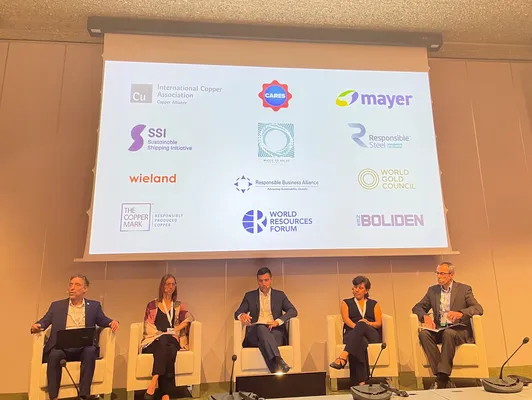
WRF’23
One of the main focal points in these engagements was at the World Resources Forum conference 2023, held in Geneva between 4th-7th September. At the event, the RRRM held a panel session and an ideation session.
The panel discussion explored the current drivers for change in recycling of metals, including legislative development and downstream user expectations. Marcel Christians (Vice President, RD&I – Wieland-Werke AG), Michèle Brülhart (Executive Director – The Copper Mark), Patrick Davison (Director – Mayer Environmental), Sonia Valdivia (Scientific Director – World Resources Forum) were joined remotely by Tyler Gillard (Chief Scientific Officer – Responsible Business Alliance). The panellists explored upstream impacts including child labour, environmental pollution and health and safety, along with downstream issues such as the boundaries of post-consumer waste. It confirmed the need for greater visibility into secondary value chains, in particular for post-consumer sources. An example given was that ~85% of the recycled electronics are currently managed through informal/unknown routes.
It noted the growth in regulations that require greater insight into ESG risk such as due diligence batteries and in relation to critical raw materials. Problems around transparency, lack of comparable information, traceability, theft and illegality, and not having reached common definitions around key concepts such as pre- and post-consumer waste, subsistence, informal sector were also discussed.
The ideation session’s aim was to look into common expectations on a due diligence process for recycled metals value chains. Using the provided flow chart of a recycling of metals value chain, breakout groups focused on “risk assessment”, “risk response and mitigation” and “verification and assurance” themes were formed. Later, participants reconvened and a rapporteur shared the insights from each group.
The ideation session included breakout groups where participants explored traceability and risks apparent at different stages of the value chain, such as human and worker’s rights, environmental issues, reputational issues, greenwashing, theft, sourcing from high-risk areas, risk of financing conflict etc. Having more collaborative based approaches to due diligence that are based on engagement and remedy rather than supplier exclusion where higher risk sources are identified were discussed.
The importance of having greater consistency and clear definitions to enhance due diligence processes, such as origin, country of origin, post-consumer, were noted. Further maturing the Tier-1 supplier auditing systems with better controls such as management system requirements, supplier pre-checks and the difficulty in individual background checks for in Tier-2 and Tier-3 levels raised questions about having a range of assurance options beyond third party certification and self-assessments. Challenges such as small margins within parts of the value chains and who pays for enhancing ESG practices and performance were discussed.
It was also noted that rather than focusing all efforts on due diligence and traceability, investing in socio-economic development projects at high-risk locations could also be an effective way to mitigate relevant supply chain risks. The ability of smaller scale subsistence actors to organise and collaborate is seen as key to improving conditions.
